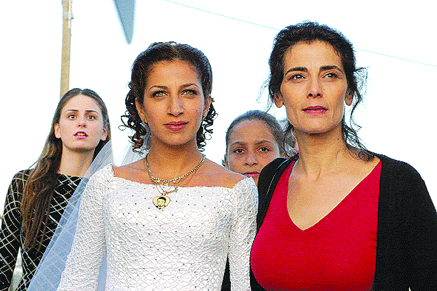Israeli grass gets greener treatment in blunt comic look at enduring political grudges
Despite its title, Israeli director Eran Riklis’ “The Syrian Bride” is as much about a community as one woman. It’s set in a village in the Golan Heights, a region occupied by Israel since 1967. The Druze community lives there. Their identity is an open question—the bride’s passport marks her nationality as undeclared. The Druze speak Arabic and consider their religion a variation of Islam, although many Middle Eastern Muslims disagree. They don’t allow conversion or interfaith marriages. Some Israeli Druze identify themselves as citizens of that country, but many Golan Heights residents consider themselves Syrian.
“The Syrian Bride” never refers overtly to the Israeli/Palestinian conflict, but its characters’ existential and political dilemmas are akin to those of West Bank Palestinians. On parole for previous political actions, Hammed (Makram J. Khoury) has chosen protest. Two of his sons have opted to escape the Golan Heights—Marwan (Ashraf Barhoum) is a businessman who travels constantly, while Hattem (Eyad Sheety) has emigrated to Russia, married a woman, and fathered a son there. Choices are more constricted for women. Amal (Hiam Abbass) wants to study social work at a university in Haifa, but her conservative husband doesn’t want her to go.
The film, which takes place on one day, revolves around the wedding of another daughter, Mona (Clara Khoury), and Tallel (Derar Sliman), a Syrian TV actor. Once Mona enters Syria, she cannot return to Israel, so a melancholy cloud hangs over the events even before bureaucracy puts stumbling blocks before them. “The Syrian Bride” underplays this sadness. The film also takes arranged marriages for granted, which may surprise Western viewers. Mona is struggling to marry a man she’s never met, not one she loves.
“The Syrian Bride” turns comic in its final third, as Mona’s plans to cross the Israel/Syria border are thwarted by guards. Because she has an Israeli exit stamp in her passport, the Syrians won’t let her in. Even after the Israeli guard blots out the stamp, they refuse her permission. Shooting in Cinemascope, Riklis captures the desert locations well, but he gets the most mileage out of the sight of a wedding procession stranded on both sides of a checkpoint. Even so, the film’s wit remains somewhat submerged.
“The Syrian Bride” tends towards the blunt and schematic—dramatic conflicts between progressive forces and tradition, absurdist situations in a no man’s land, an image of a single tear in a woman’s eye. It recalls Palestinian director Michel Khleifi’s “Wedding in Galilee,” but the comparison doesn’t flatter Riklis. Despite the level of Israeli/Arab cooperation that went into its production—co-writer Suha Arraf and most of the cast are Palestinian—“The Syrian Bride” winds up marginalizing its Syrian characters. Mona and her family are treated as complex individuals, while we learn almost nothing about Tallel, who’s seen filming a buffoonish role on a sitcom, and his relatives. Even the Israeli bureaucrats come off better than their Syrian counterparts.
Wedding films have become a sub-genre that seems to have particular resonance for Israeli and Palestinian directors. In addition to “Wedding in Galilee,” there’s “Paradise Now” director Hany Abu-Assad’s 2002 “Rana’s Wedding.” In bringing a family together, it’s easy to create a social microcosm. It’s also too easy to turn characters from people into symbols.
Amal is as central to the film’s design as Mona; however, she seems designed largely to illuminate the problems of Middle Eastern women.
Riklis emphasizes the most obvious aspects of his story, particularly Amal’s struggle, and deals short shrift to subtler ones. We get little sense of what Mona and Tallel’s marriage might look like. The characters certainly acknowledge their sadness at never being able to see Mona again—although they could probably get together if they met in a country other than Israel or Syria—but this practically becomes a side issue. It’s dealt with pretty bluntly. Hammed has to acknowledge Hattem, despite disapproving of his marriage. Hammed’s politics are left rather vague, although maybe Israeli viewers can easily fill in the gaps. All the action circles around Mona, who’s probably the most passive and mysterious member of her family, and leaves her stranded on the sidelines in a film named after her. Although it takes place in a much different setting—the Georgian-Israeli immigrant community—Riklis’ compatriot Dover Kohashvili’s “Late Marriage” offers a far more complex examination of patriarchy and the difficulty of rebelling successfully against it. “The Syrian Bride” is concerned with the arbitrary oppressiveness of borders, but it delivers its human drama with a sledgehammer.
gaycitynews.com



































